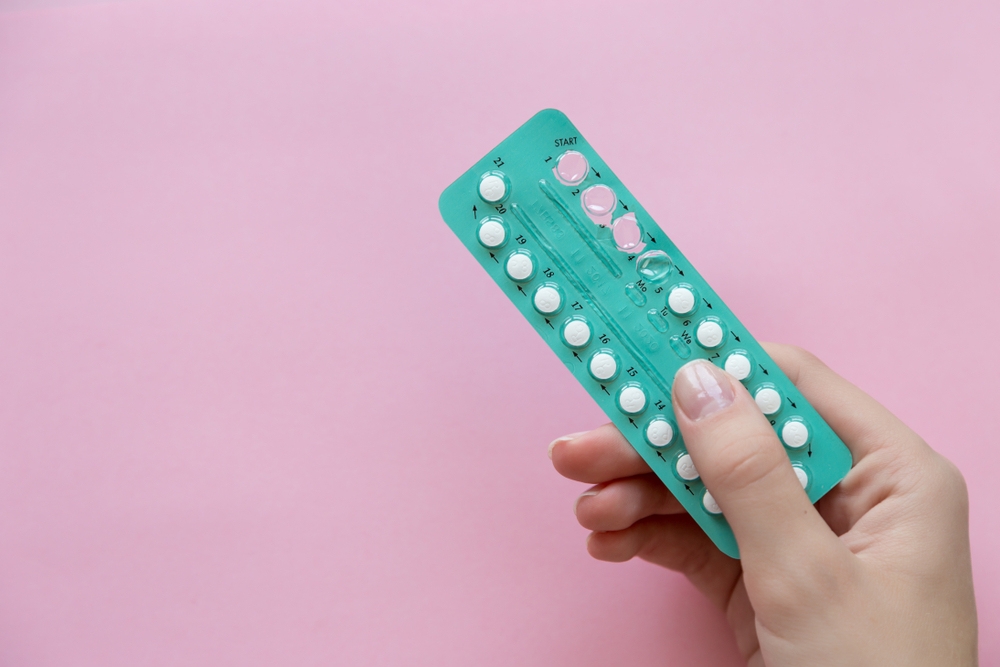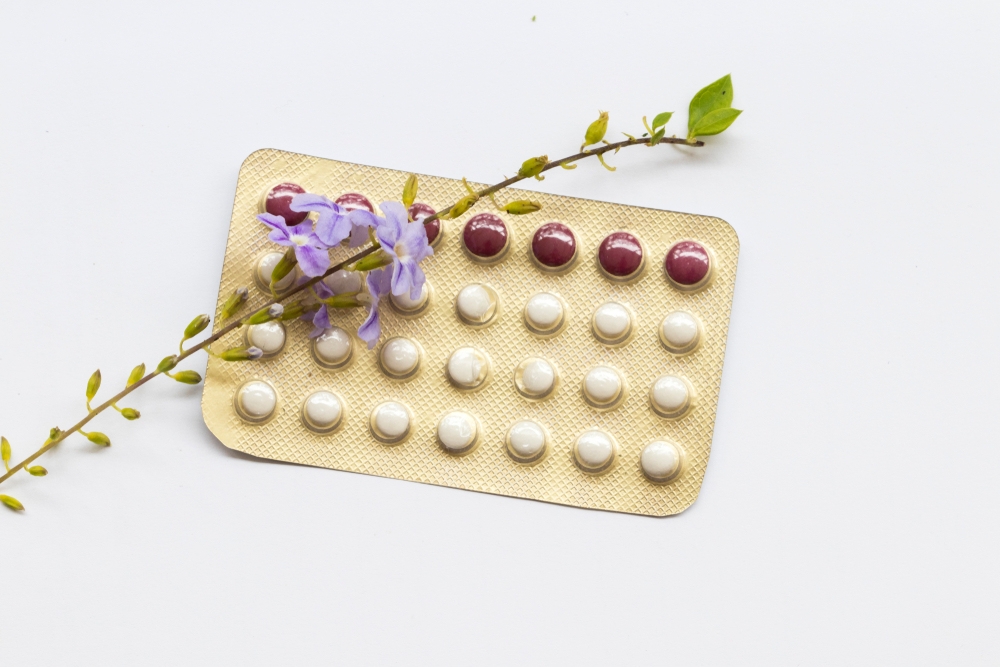
Contraceptive pill is a kind of hormone contraception, which uses hormones to prevent women from becoming pregnant. There are several different types of hormone contraception, some of which contain both estrogen and progesterone, while others contain only progesterone.
Hormonal contraception can achieve contraceptive purposes through different mechanisms of action:
1. Inhibition of ovulation. It is mainly to inhibit the secretion peak of luteinizing hormone. Without luteinizing hormone, the body will not ovulate.
2. Keep the consistency of cervical mucus thick and make sperm difficult to penetrate.
3. The increment of endometrium is not synchronized with embryo development, thus affecting the implantation of fertilized eggs.
4. Damage normal tubal movement and interfere with implantation of fertilized eggs.
Different contraceptives have different characteristics in what.
Oral contraceptives (short-acting): Because it’s over-the-counter, Drugs are readily available at any pharmacy, As long as there is no leakage, The contraceptive effect can reach more than 99%. However, if it is missed, Especially in 7 days without medication interval, it is easy to occur contraceptive failure. However, oral tablets can be stopped at any time when contraception is not needed. Moreover, short-acting contraceptives can make menstrual bleeding more regular and reduce the number of bleeding days. Common preparations on the market include Marvelon, Daying 35, Yousiming and Yousiyue.
Patch (short effect): Can be pasted on the upper arm, shoulder, back or hip, the patch contains contraceptive hormones. Because the patch is absorbed through the skin, it will be affected by many external factors, such as skin condition, whether the patch is compressed, body temperature changes, etc., the patch contraceptive effect may not be particularly good.
Oral contraceptives (long-acting): Compound long-acting oral contraceptives are taken almost once a month, but because the months are sometimes 30 days, sometimes 31 days, sometimes 29 days or 28 days, the taking time may be irregular, resulting in contraceptive failure. Moreover, because it is a long-acting preparation, the estrogen content in it is relatively high, and the risk of adverse reactions is high, it has been rarely used at present.
Emergency contraceptives: At present, there are two kinds of emergency contraceptives in our country, mifepristone and levonorgestrel respectively.
1. Mifepristone. Mifepristone is rarely used by people because it is a prescription drug and can only be bought with a doctor’s prescription. It is very inconvenient to obtain it. Moreover, delayed ovulation of mifepristone will lead to delayed menstruation, which may lead to anxiety among contraceptive users for fear of increasing contraceptive failure.
2. Levonorgestrel. Levonorgestrel is the most commonly used emergency contraceptive and is an over-the-counter drug, which can be easily purchased in pharmacies without a doctor’s prescription.
The above two kinds of emergency contraceptives are only effective after 72 hours of unprotected sex. Beyond this time, contraception is easy to fail.
How to use it correctly?
1, estrogen and progesterone compound contraceptive: usually take medicine continuously for 21 days, then stop taking medicine for 7 days, then take medicine continuously for 21 days, stop taking medicine for 7 days, so circulation. Some tablets are taken medicine continuously for 24 days, then stop taking medicine for 4 days. Specific medication methods are as follows:
Quick start method: Take the medicine immediately after receiving it, and use barrier contraception for the first 7 days of taking the medicine.
Start on Sunday: Start taking medicine on the first Sunday after menstruation and use barrier contraception for the first 7 days of taking medicine. This method can avoid bleeding on weekends.
First-day start-up method: Starting taking medicine on the first day of menstruation can achieve the maximum contraceptive effect in the first cycle, and there is no need to use spare contraceptive measures on the first 7 days of starting taking medicine.
2. Oral contraceptives (long-acting): The first time you take the medicine is to take one tablet (after lunch) on the 5th day of menstruation (the day of menstruation is counted as the 1st day), and then take one tablet after 20 days (that is, the 26th day), that is, take two tablets in the 1st cycle. After that, you will take one tablet every month according to the date of the second time of taking the medicine.
3. Emergency Contraceptives
Mifepristone: 10mg orally within 72 hours after unprotected sex or contraceptive failure.
Levonorgestrel: Oral administration of 1.5 mg within 72 hours after unprotected sex or contraceptive failure, or 0.75 mg for the first time and 0.75 mg at intervals of 12 hours. Although there are two methods of administration with similar efficacy and side effects, the first is recommended, because the two intervals can easily lead to patients missing drugs and increase the risk of contraceptive failure.
Applicable population:
Oral contraceptives: For most healthy, non-smoking women, hormone contraception is a safe and reliable contraceptive method, which can be used until the menopause age is about 51-55 years old.
Emergency contraceptives: Emergency contraceptives should be used as long as unprotected sex has occurred recently, or contraceptive measures (such as condoms and short-acting contraceptives) have been used, but contraceptive failure may be caused by some reasons (such as broken and slipped condoms, missing more than 2 short-acting contraceptives, etc.).
How effective is contraception?
1. Medium-and short-acting contraceptives, such as oral short-acting contraceptives, naturally have poor compliance because they have to be taken every day and it is best to take the medicine at the same time every day, so the probability of contraceptive failure is also high, but as long as they are not missed, the effective rate can reach more than 99%.
2. The effective rate of emergency contraception is about 80%, because it will not prevent fertilized eggs from implanting in the uterus, so if ovulation has occurred before taking emergency contraception, oral emergency contraception is ineffective.
Therefore, it is necessary to weigh the advantages and disadvantages of contraceptive methods before choosing the contraceptive methods that you can accept.
The main adverse reactions of contraceptives are irregular bleeding or intravenous drip bleeding, but the general estrogen and progesterone compound contraceptives will have less intravenous drip bleeding, but breast tenderness, nausea and abdominal distension may occur, which will usually improve in two to three months.
The main adverse reaction of emergency contraception pill is nausea, Vomiting. If vomiting occurs within 2 hours after taking the medicine, you must take the medicine again. But overall, levonorgestrel has a very low risk of vomiting. In addition, irregular bleeding may occur within one month after taking the medicine, some of which occur in the first week. Uncommon side effects include dizziness, fatigue, headache, breast tenderness and lower abdominal pain.

What taboos or precautions
1. For the following women with special circumstances, it is not recommended to use estrogen and progesterone compound contraceptive methods such as estrogen and progesterone short-acting contraceptives, mainly considering increasing the risk of thrombosis:
1) 35 years of age or more, smoking 15 cigarettes or more per day;
2) aura migraine;
3) have basic cardiovascular disease or vascular embolism disease;
4) Hypertension
5) Diabetes has vascular complications
2. Estrogen and progesterone compound contraceptives interact with some drugs, such as some antiepileptic drugs such as phenytoin, carbamazepine and anti-tuberculosis drug rifampicin, which may reduce the contraceptive effect.
3. Pure progesterone contraceptives are as effective as compound contraceptives, It is suitable for women who cannot take estrogen and progesterone compound contraceptives, such as breast-feeding, migraine or women with vascular embolic diseases. Pay attention to taking the medicine at the same time every day. If you take it three hours late, the contraceptive effect of this medicine may decrease. In this case, emergency contraceptives are needed.
4. Emergency contraceptive pills should be taken as soon as possible after sexual behavior. Tablets have the best effect within 72 hours (3 days) after sexual behavior. If you take it again after 3-5 days, the effect will be significantly reduced or even ineffective. Therefore, the earlier you take it, the better the effect will be. If you have sex again after taking the medicine, you may become pregnant, and the emergency contraception pill should only be used once. Therefore, if you have sex again after taking the emergency contraception pill, be sure to use condoms or another contraceptive method.
What are the common problems in the process of using contraceptives?
1. Regarding contraceptive methods, There are many choices. However, the specific choice is, Need a comprehensive consideration of various factors, such as whether to hope for long-term contraception, whether to insist on taking medicine every day, side effects how, will change menstruation, how to cost, whether there are some internal diseases, etc. No contraceptive method is foolproof, need to weigh the advantages and disadvantages of contraceptive methods, and then choose.
2. Besides contraceptive use, estrogen and progesterone compound contraceptives can also be used to treat acne, hirsutism, menorrhagia, dysmenorrhea, pelvic pain, premenstrual syndrome and reduce the risks of ovarian cancer and endometrial cancer.
3. Obese perimenopausal women should completely avoid using estrogen and progesterone compound contraceptives, because the risk of venous thromboembolism increases with age and BMI.
4. How to remedy the leakage of estrogen and progesterone compound contraceptives?
1) If the omission occurs during the first week (i.e. The 1st to 7th day of the 28-day cycle), Take the medicine immediately when you think of missing it, even if it means taking 2 tablets on the same day and using barrier contraception for the next 7 days. If you miss 2 or more tablets, you still need to take barrier measures for the next 7 days. If there is no protective sex within this week, you need to use emergency contraceptives immediately to reduce the chances of pregnancy.
2) If the missed medication occurs in the 2nd week (8th to 14th), take it immediately at the time of remembering the missed medication, even if this means taking 2 tablets on the same day. If the previous 7 days are continuous medication, barrier contraception may not be used afterwards. If 2 or more tablets are missed, barrier measures need to be taken for the next 7 days.
3) if that leak occur in the third week (15th to 21st), Take the medicine immediately when you think of missing it, even if this means taking 2 tablets on the same day, taking all the remaining tablets at the same time, stopping taking the medicine and continuing to take the medicine for the next cycle. If you cannot start taking the next cycle, you should take the spare barrier contraception first until the hormone contraceptive pill in the next box is used for 7 days.
4. Emergency contraception is only used occasionally or as a backup method (contraceptive failure) and cannot be used as the main contraceptive method for routine use.
5. Emergency contraception does not mean that you can only take it many times a year, but you should take it as long as you need it. After all, using emergency contraception after weighing the pros and cons is always much less harmful than pregnancy. However, overall, the current research does not believe that emergency contraception will have adverse effects on women’s health and future fertility.
6. At present, there is no evidence that pregnancy caused by failure of emergency contraception has teratogenic effect, nor is there any evidence that ectopic pregnancy will be caused, because emergency contraception will not interfere with pregnancy or harm fetus.
